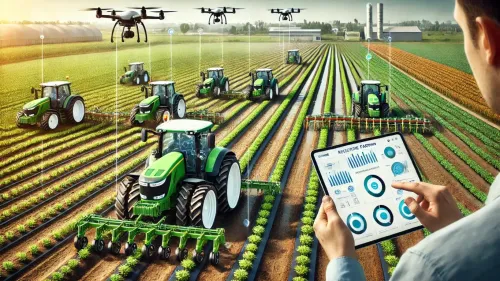Ad
Ad
Advantages of greenhouse farming in Indian agriculture

Greenhouse farming, also known as polyhouse farming, is a revolutionary technique that has gained significant importance in India's agricultural industry. It is a sustainable and innovative approach that holds the key to transforming agriculture.
This innovative method involves cultivating crops within enclosed structures, providing a controlled environment for optimal growth. The adoption of greenhouse farming marks a transformative shift in traditional agricultural practices, contributing to increased productivity and sustainability in Indian agriculture.
Greenhouse farming in India promotes sustainable food production and can solve the problems caused by conventional farming techniques using cutting-edge and modern technology. In this article, we have discussed the importance and benefits of greenhouse farming in India.
Greenhouse farming in India
Greenhouse farming is also known as protected cultivation or controlled environment agriculture. This innovative farming technique involves the cultivation of crops within a controlled environment, providing optimal conditions for growth.
Greenhouses use structures covered with transparent materials to allow sunlight while regulating temperature, humidity, and other environmental factors. This method has become increasingly popular due to its numerous advantages, making it a crucial component of India's agricultural landscape.
Also Read: Organic Farming: Pest Management Strategies for Sustainable Growth
Greenhouse farming is typically made of materials like glass or polyethene, which allows sunlight to penetrate while creating a controlled environment. This controlled environment enables farmers to manipulate various factors such as temperature, humidity, light, and ventilation, leading to enhanced crop productivity and quality.
While people often use the terms "greenhouse" and "polyhouse" interchangeably, there's a slight difference. A greenhouse typically has a framework made of metal or wood and is covered with transparent material.
On the other hand, a polyhouse specifically uses polyethylene plastic for covering. The choice between the two depends on factors like cost, climate, and the type of crops being cultivated.
Importance of Greenhouse Farming in India
Increased Crop Yield
Greenhouses optimize growing conditions, leading to increased crop yields. The controlled environment allows farmers to tailor conditions to the specific needs of each crop, resulting in faster growth rates and higher yields compared to traditional open-field farming.
Year-Round Cultivation
One of the key advantages of greenhouse farming is its ability to facilitate year-round cultivation. In a country like India, where climatic variations are considerable, greenhouses provide a stable environment for crops irrespective of external weather conditions. This ensures a consistent and reliable supply of fresh produce throughout the year.
Resource Efficiency
Greenhouse farming is inherently more resource-efficient. By controlling factors such as water, fertilizers, and pesticides, farmers can minimize waste and optimize resource utilization. This is particularly crucial in a country like India, where water scarcity is a pressing issue.
Maximum use of Resources
Greenhouse farming allows for precise control over resources such as water and nutrients. This not only conserves resources but also minimizes environmental impact by reducing runoff and leaching of chemicals into the soil.
Crop Protection
Greenhouses act as a protective barrier against pests, diseases, and extreme weather conditions. This reduces the reliance on chemical pesticides and ensures healthier crops. As a result, farmers can produce high-quality, pesticide-free produce that meets stringent quality standards.
Diversification of Crops
The controlled environment of greenhouses enables farmers to experiment with a wide variety of crops that may not thrive in the local climate otherwise. This encourages diversification, offering farmers the opportunity to grow high-value crops that cater to specific market demands.
Advantages of Greenhouse Farming
The benefits of greenhouse farming are numerous. The yield may be 10-12 times higher than that of outdoor cultivation depending upon the type of greenhouse, type of crop, and environmental control facilities. The reliability of crops increases under greenhouse cultivation. Ideally suited for vegetables and flower crops, greenhouse farming offers many benefits to farmers and consumers alike.
Greenhouses provide a controlled and efficient environment for growing crops, offering benefits such as climate control, protection against pests and diseases, increased productivity, extended growing seasons, and better-quality crops. With these advantages, farmers can optimize conditions for various crops, ensuring healthier and more reliable yields throughout the year.
Extended Growing Seasons
Greenhouses extend growing seasons, allowing for multiple crop cycles in a year. This increases overall productivity and income for farmers.
Climate Control
Greenhouses enable the regulation of temperature and humidity, creating an ideal climate for plant growth. This is especially beneficial in regions with extreme weather conditions.
Water Conservation
Precision irrigation systems in greenhouses contribute to water conservation by delivering the exact amount of water needed by each plant. This is crucial in addressing water scarcity challenges.
Quality Assurance
The controlled environment in greenhouses ensures consistent product quality, making it easier for farmers to meet market standards and consumer expectations.
Space Efficiency
Greenhouse farming allows for vertical cultivation and efficient space utilization, making it suitable for areas with limited fertile land.
In short, Greenhouse farming enables year-round cultivation, protects crops from extreme weather events, and facilitates the growth of crops not native to the region. It also holds immense significance in Indian agriculture due to several reasons. For instance, it helps reduce the dependency on seasonal changes and ensures a stable and reliable yield.
Also Read: Banana Farming In India: A Comprehensive Guide To Banana Farm, Plantation, And Varieties
Conclusion
Greenhouse farming has emerged as a transformative and sustainable agricultural practice in India. Its ability to provide a controlled environment for crop growth, protect against external threats, and optimize resource utilization makes it a crucial component in ensuring food security and economic prosperity.
As the demand for high-quality, year-round produce continues to grow, greenhouse farming is likely to play an increasingly vital role in shaping the future of Indian agriculture.
Features & Articles
Top 5 Swaraj Tractors for Indian Farmers in 2025
Explore the top 5 Swaraj tractors in India, offering power, durability, and performance for every type of Indian farmer....
02-Jun-25 10:06 AM
Read Full NewsThinking of Buying a Second Hand Tractor? Read These Top 10 Important Tips
Explore key tips to inspect the engine, tyres, brakes, and more before buying a second hand tractor in India....
14-Apr-25 08:54 AM
Read Full NewsComprehensive Guide to Tractor Transmission System: Types, Functions, and Future Innovations
Learn about tractor transmission types, components, functions, and selection factors to enhance efficiency, performance, and agricultural productivity....
12-Mar-25 09:14 AM
Read Full NewsModern Tractors and Precision Farming: Transforming Agriculture for Sustainability
Precision farming enhances agriculture by integrating GPS, AI, and modern tractors for sustainable, efficient, and productive farming practices in India....
05-Feb-25 11:57 AM
Read Full NewsTop 10 Tractors Under 30 HP in India 2025: Guide
Top 10 tractors under 30 HP in India offer efficiency, affordability, and power, ideal for small farms with diverse agricultural needs....
03-Feb-25 01:17 PM
Read Full NewsNew Holland 3630 TX Super Plus vs Farmtrac 60 PowerMaxx: Detailed Comparison
Compare New Holland 3630 and Farmtrac 60 tractors by specs, price, and features to find the perfect fit for your farm....
15-Jan-25 12:23 PM
Read Full NewsAd
Ad
As featured on:


Registered Office Address
Delente Technologies Pvt. Ltd.
M3M Cosmopolitan, 12th Cosmopolitan,
Golf Course Ext Rd, Sector 66, Gurugram, Haryana
pincode - 122002




















